The Trials of the Spanish Left
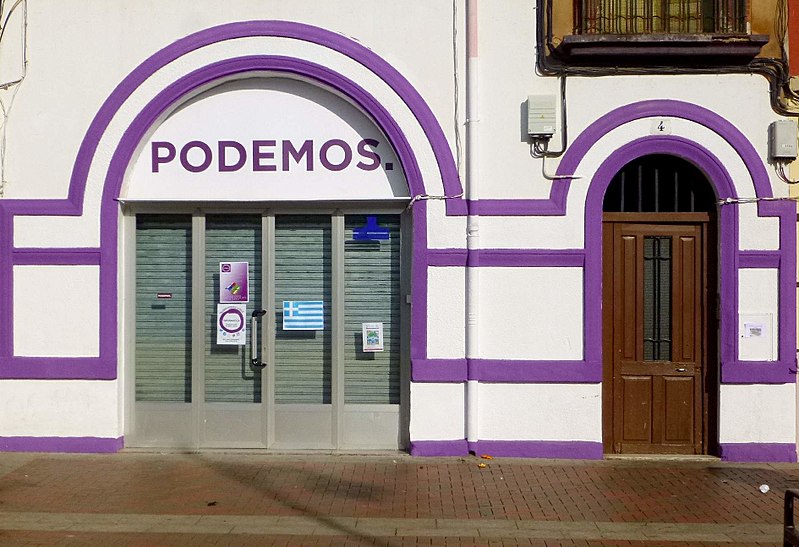
Editor’s Note: This article was written prior to the April 28 elections. Unidos Podemos won 14% of the vote and 43 seats, while the left-wing parties, in general, won a decisive victory over the right.
Just over four years ago, in late 2014, Podemos was ascendant. The Spanish political party had won a respectable 8% of the vote for a fourth place finish in the European Parliament elections despite having been founded just a few months earlier, and by December it had skyrocketed in the national election polls, with the support of over 30% of voters and some estimates putting it in first place. When the election came at the end of 2015 some of the hype had died down, but the party still came in third with 20.7% of the vote, shaking up Spain’s political establishment and ending the two-party system that had dominated the country for decades.
However, with another general election coming up on April 28, Podemos (now known as Unidos Podemos) is lagging in the polls and faced with internal conflicts that threaten to tear it apart. As parties like Ciudadanos and the newly-popular far-right party Vox have been able to capitalize off the Catalan crisis of 2017, Podemos finds itself struggling to remain relevant to most Spanish voters, many of whom currently just don’t see the radical party as a reliable option.
Founded in January 2014, Podemos emerged out of the Indignados movement, which held massive protests against austerity and corruption in 2011. It presented itself as a more radical left-wing alternative to the social democratic Socialist Party (PSOE), which many saw as stagnant and corrupt, and sought to “take heaven by assault” in the words of party founder and Secretary-General Pablo Iglesias. Podemos was a vehicle for the energy and frustration coming out of the protests, giving a voice to people who had never before had a political consciousness. The party is structured around direct democracy, using online forums to hold votes and allow party members to propose policy changes. Keeping with that ethos, they want to bring these ideas to the government by implementing referendums and ballot initiatives for the whole country.
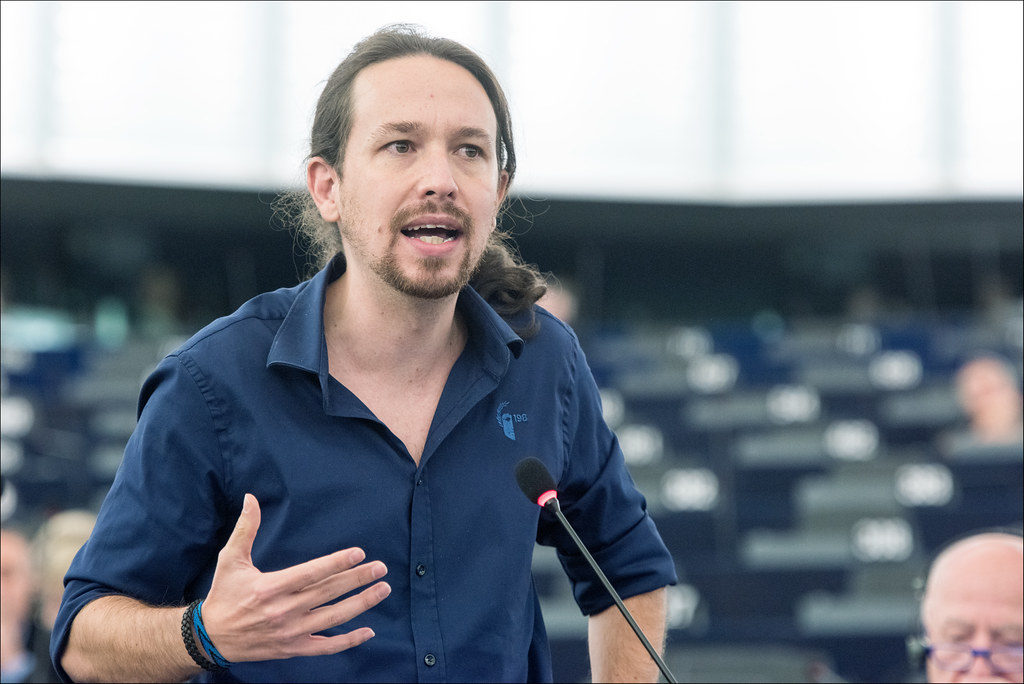
While drawing support from disillusioned PSOE voters, Podemos also overshadowed the traditional leftist Izquierda Unida (IU), a coalition of radical left-wing parties centred around the Communist Party of Spain. IU was weak and stale, winning only a handful of seats each election and never presenting any threat to the established parties at the national level. Following the failure of any party to form a government after the 2015 elections, Podemos and IU merged to form Unidos Podemos (UP) in the hopes that a united front would help them be more successful in the snap elections of 2016. They landed in third place again and won the same number of seats as the two parties had in 2015, but lost 1 million votes, the result of voter frustration and the skepticism of some IU supporters towards the new coalition. Despite this setback, Podemos was able to use the creation of UP to build a huge network of alliances between dozens of different parties across the country which has allowed it to exert influence on the local, regional, and national level.
Spain is home to a staggering 4500-plus political parties, a result of the ease of registration. While many of these aren’t active, a huge amount still are, mostly local ones. Some of the more obscure parties range from the Unitarian Candidacy of Workers (CUT), a small far-left party that runs the Andalusian town of Marinaleda along socialist lines and holds a seat in the national parliament through UP, to the Leonese People’s Union (UPL), a party in Castille and León that advocates for León to separate to form its own region, to PACMA, the Animalist Party Against the Mistreatment of Animals, which received 1.19% in the last general elections. Others are lesser known still.
In the years since Podemos’s founding, it’s brought many of these parties into its fold—by formally incorporating them into Unidos Podemos, through electoral alliances, or through electoral coalitions like the one it has in Valencia with Compromís, a regionalist party that itself originated as an electoral coalition between smaller parties. Podemos gained its first major victories this way in the local elections of May 2015, where its allies Manuela Carmena and Ada Colau won the mayorships of Madrid and Barcelona with platforms that merged left-wing and environmentalist parties with Podemos.
UP has had three main alliances on the regional level—the aforementioned electoral alliance with Compromís in Valencia, known as A la valenciana, an alliance in Catalonia with the coalition Catalunya en Comú, and as part of the integrated political party En Marea in Galicia, which merged Podemos and IU with the left-wing Galician sovereigntist party Anova. With these alliances and some more minor ones in other regions, UP has largely associated itself with elements of regional left-nationalists. This doesn’t mean that Podemos supports the regional breakup of Spain, but they share a common enemy if not a common goal.
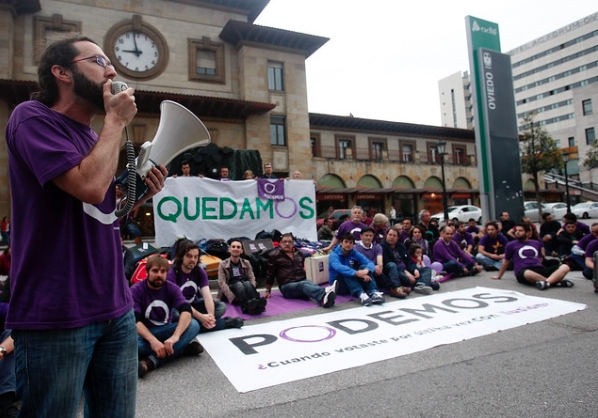
The issue of centralization in Spain is an old one, but the current tensions date back to the Franco era, when Basques, Catalans, Galicians, and other linguistic minorities were suppressed and their languages banned. While language rights have been restored and millions of euros put into minority language promotion, nationalist parties believe that the Spanish state is still centralizing and oppressive. The Spanish government did little to assuage these beliefs during the 2017 Catalan independence referendum, during which police attacked peaceful voters.
Unlike other post-fascist states, Spain never made any attempt at “de-Francoization.” Thus, the main parties of the right—People’s Party (PP), Ciudadanos, and Vox—still uphold many elements of the Francoist legacy, especially as they pertain to the idea of Spain as a single, unitary entity. These three parties are all strongly anti-nationalist (in the sense that they oppose regional separatism), as is PSOE, which tends to support the status quo in matters relating to the Spanish constitution. Podemos on the other hand takes a much more critical stance, arguing that more needs to be done to purge Franco’s legacy, including the abolition of the monarchy and the legalization and recognition of independence referendums. Given their common criticisms of the Spanish national project, Podemos and these nationalist parties seemed like useful allies for each other. That alliance is starting to fracture.
In Galicia, Podemos, Anova, and IU split from En Marea earlier this year following the election of Luís Villares as leader of the party, an election which they allege to be fraudulent. Podemos and IU will contest the election together, while Anova announced they won’t be running candidates. If UP fails to reconcile their differences with En Marea and the Galician Nationalist Bloc, a more hardline pro-independence party, their votes will be split to all of their detriment.
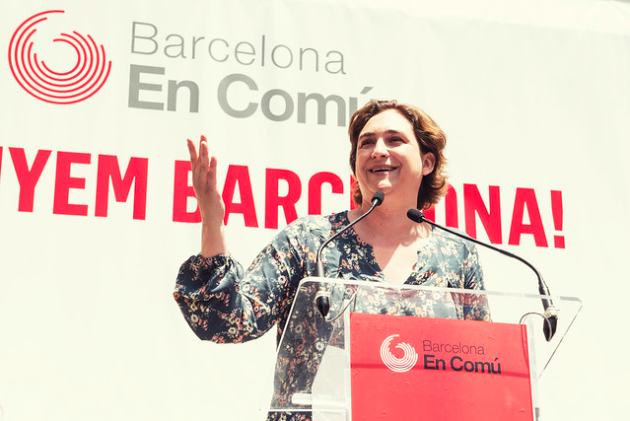
In Catalonia, where tensions between nationalists and centralists are at their highest, Podemos takes the middle ground. On the centralist side, Ciudadanos, PSOE, and PP all strongly oppose independence and the holding of any referendum on the matter. The nationalists, who control the Catalan government, are comprised of the centre-right liberal party Junts per Catalunya, the center-left Republican Left of Catalonia (ERC), and the far-left Popular Unity Candidacy (CUP). Rather than aligning with any of these parties, Podemos works with an alliance made up of smaller leftist and environmentalist parties that draws much of its base from Ada Colau’s Barcelona en Comú. Podemos would like the Spanish and Catalan governments to work together to hold a recognized referendum, and was in favour of conducting the 2017 vote, but Pablo Iglesias warned that it would lack binding legitimacy.
While this may be an ideologically admirable position, it hasn’t done much for Podemos strategically. Their middle-of-the-road approach makes them unappealing to most Catalan voters, for whom the issue of independence is more polarizing and important than anything else. They only won 8 seats in the regional elections in 2017, a distant fifth place. In the rest of Spain, where independence is highly unpopular, their support for Catalan self-determination has hurt them in the polls. Since the referendum PSOE has firmly established itself as the dominant party on the left/center-left, as UP has consistently polled under 20 points. The gap between the two is particularly evident at the moment, with UP getting as low as 11% in recent weeks.
There’s no lost love between Podemos and the Catalan nationalist parties. At the national level UP and the Catalan and Basque nationalists had been supporting the PSOE government of Pedro Sánchez, which came to power last summer after ousting Mariano Rajoy’s PP government. Podemos helped negotiate the budget, which included a 23% minimum wage hike and higher taxes on the rich. Holding together a tenuous coalition, Sánchez and Podemos were both desperate to avoid early elections, but Sánchez’s failure to placate the Catalan nationalists led them to vote against the budget, forcing him to call early elections. All in all, the Catalan question has thrown a wrench into Spanish politics, and Podemos are the ones who have suffered the worst. Their support levels are falling and the prospect of a more emboldened, radical right-wing government than the country has seen in decades threatens to overturn any of the progress they’ve made in their short stint with the government.
UP’s latest problem has been a long time coming and has nothing to do with Catalonia or the breakdown of regional alliances. Rather, it’s a split within the party itself. In January, senior Podemos official and party co-founder Íñigo Errejón declared he was leaving the party to help former UP ally and Madrid mayor Manuela Carmena launch Más Madrid, which will compete against Podemos in the regional elections in Madrid. Carmena announced Más Madrid late last year following a split with UP at the local level. She wanted to bring her own people into her government while UP wanted to involve more partisans from Podemos and IU. Errejón confirmed he will stand as the candidate for the President of the Community of Madrid, and has attracted the support of many Podemos voters.
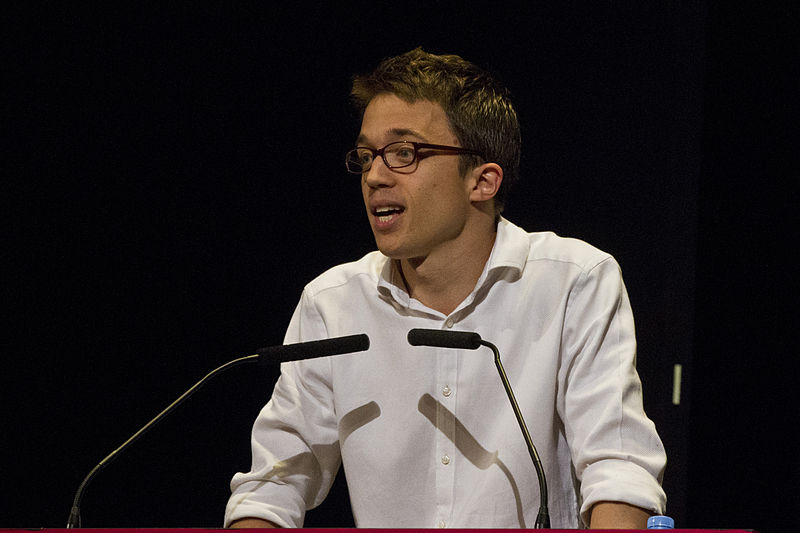
With regional splits and plummeting poll numbers, these are dire times for Podemos. This election certainly won’t be the end for them, but they aren’t the catalyst for hope that they were a few years ago. Now, it’s impossible to look at Spain without a sense of foreboding— with the Catalan crisis with no end in sight and the meteoric rise of the far-right Vox. Rather than seeing radical progressive change, it looks like Spain may be slipping back towards conservatism and traditionalism. Podemos is in part a victim of this political environment, but also in part responsible for it. Their strategic mistakes have cost them dearly, and while they still maintain high youth support, that’s not enough to win elections. But that doesn’t mean the answer is to give up the party and move on. Errejón claims he was convinced to leave Podemos after its poor performance in Andalusia, but there’s little indication Más Madrid will have any more electoral success. If the left wants to win it will have to resolve its internal contradictions. Otherwise all these varying factions will remain marginal players, watching from the sidelines as the traditional forces of Spanish politics continue to dominate the country.
Edited by John Weston
